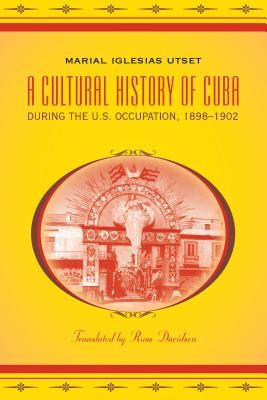
- We will send in 10–14 business days.
- Author: Marial Iglesias Utset
- Publisher: University of North Carolina Press
- ISBN-10: 0807871923
- ISBN-13: 9780807871928
- Format: 15.8 x 23.4 x 1.4 cm, softcover
- Language: English
- SAVE -10% with code: EXTRA
A Cultural History of Cuba during the U.S. Occupation, 1898-1902 (e-book) (used book) | bookbook.eu
Reviews
Description
In this cultural history of Cuba during the United States' brief but influential occupation from 1898 to 1902--a key transitional period following the Spanish-American War--Marial Iglesias Utset sheds light on the complex set of pressures that guided the formation and production of a burgeoning Cuban nationalism.
Drawing on archival and published sources, Iglesias illustrates the process by which Cubans maintained and created their own culturally relevant national symbols in the face of the U.S. occupation. Tracing Cuba's efforts to modernize in conjunction with plans by U.S. officials to shape the process, Iglesias analyzes, among other things, the influence of the English language on Spanish usage; the imposition of North American holidays, such as Thanksgiving, in place of traditional Cuban celebrations; the transformation of Havana into a new metropolis; and the development of patriotic symbols, including the Cuban flag, songs, monuments, and ceremonies. Iglesias argues that the Cuban response to U.S. imperialism, though largely critical, indeed involved elements of reliance, accommodation, and welcome. Above all, Iglesias argues, Cubans engaged the Americans on multiple levels, and her work demonstrates how their ambiguous responses to the U.S. occupation shaped the cultural transformation that gave rise to a new Cuban nationalism.
EXTRA 10 % discount with code: EXTRA
The promotion ends in 8d.23:24:47
The discount code is valid when purchasing from 10 €. Discounts do not stack.
- Author: Marial Iglesias Utset
- Publisher: University of North Carolina Press
- ISBN-10: 0807871923
- ISBN-13: 9780807871928
- Format: 15.8 x 23.4 x 1.4 cm, softcover
- Language: English English
In this cultural history of Cuba during the United States' brief but influential occupation from 1898 to 1902--a key transitional period following the Spanish-American War--Marial Iglesias Utset sheds light on the complex set of pressures that guided the formation and production of a burgeoning Cuban nationalism.
Drawing on archival and published sources, Iglesias illustrates the process by which Cubans maintained and created their own culturally relevant national symbols in the face of the U.S. occupation. Tracing Cuba's efforts to modernize in conjunction with plans by U.S. officials to shape the process, Iglesias analyzes, among other things, the influence of the English language on Spanish usage; the imposition of North American holidays, such as Thanksgiving, in place of traditional Cuban celebrations; the transformation of Havana into a new metropolis; and the development of patriotic symbols, including the Cuban flag, songs, monuments, and ceremonies. Iglesias argues that the Cuban response to U.S. imperialism, though largely critical, indeed involved elements of reliance, accommodation, and welcome. Above all, Iglesias argues, Cubans engaged the Americans on multiple levels, and her work demonstrates how their ambiguous responses to the U.S. occupation shaped the cultural transformation that gave rise to a new Cuban nationalism.


Reviews